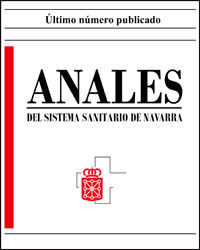Hiponatremia aguda grave en un paciente esquizofrénico potomano
Palabras clave:
Convulsiones. Esquizofrenia. Hiponatremia. Aripiprazol. Potomanía.Resumen
La hiponatremia aguda grave ocasiona una encefalopatía metabólica, cuya fisiopatología es el edema cerebral, y los síntomas más severos son las convulsiones y el coma. Se presenta el caso de una hiponatremia extrema de origen multifactorial en un paciente esquizofrénico potomano. La potomanía no suele ocasionar hiponatremia, salvo coexistencia con otros mecanismos desencadenantes. El paciente descrito presentaba datos de secreción inadecuada de vasopresina (SIADH) y una hipokaliemia intensa, secundaria a vómitos y al tratamiento con indapamida, que perpetúa el déficit extracelular de sodio. En el tratamiento del paciente, el único fármaco de introducción reciente fue el aripiprazol, neuroléptico con el que se han notificado casos de secreción inadecuada de vasopresina. La corrección de la hiponatremia aguda grave es una urgencia vital, independientemente de la causa, y consiste en la administración de suero salino al 3%. El sodio no debe aumentar en más de 25 mmol/L durante las primeras 24-48 horas para evitar un daño cerebral secundario.Descargas
Descargas
Publicado
Cómo citar
Número
Sección
Licencia
La revista Anales del Sistema Sanitario de Navarra es publicada por el Departamento de Salud del Gobierno de Navarra (España), quien conserva los derechos patrimoniales (copyright ) sobre el artículo publicado y favorece y permite la difusión del mismo bajo licencia Creative Commons Reconocimiento-CompartirIgual 4.0 Internacional (CC BY-SA 4.0). Esta licencia permite copiar, usar, difundir, transmitir y exponer públicamente el artículo, siempre que siempre que se cite la autoría y la publicación inicial en Anales del Sistema Sanitario de Navarra, y se distinga la existencia de esta licencia de uso.








